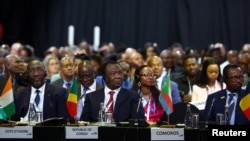The United States has agreed to trade and investment deals worth $14.2 billion with African nations over the past year. The agreements are part of U.S. efforts to combat the growing influence on the continent by China.
The new agreements represent a 67 percent increase from 2022, British Robinson found. He works for the Prosper Africa trade and business program. The program connects U.S. and African businesses.
Robinson said, “The U.S. business and investment community is increasingly recognizing Africa’s… market potential.” He added that the continent is also home to the world’s youngest population which could mean new business deals and job creation.
Judd Devermont is the U.S. National Security Council senior director for African Affairs. Devermont said the U.S. has promised to invest some $55 billion over three years.
By the end of 2023, he said the U.S. has delivered more than 40 percent of this promise. And he expected the U.S. to reach over 70 percent of its goal next year. The investment has expanded trade and technology and helped with food and health security in the continent.
Last year, American President Joe Biden said the U.S. would go “all in” during a meeting with African leaders in Washington, D.C. The promise came as China was expanding its influence in the continent with new public structures, investments, loans, and other programs.
Biden also called for more African voices in world organizations. This September, with U.S. support, the African Union gained permanent membership in the G20, an organization of the world’s largest economies.
Devermont said the U.S. is also supporting a third seat for Sub-Saharan Africa on the Internal Monetary Fund leadership group. And the U.S. is calling for permanent representation of Africa at the U.N. Security Council.
Investment in conflict areas
The U.S. has had to change its investment and trade policies in countries affected by conflict.
Jonathan Pratt is the Principal Deputy Assistant Secretary in the Bureau of African Affairs in the U.S. Department of State. He said that, in Sudan, U.S. policy has been to put economic measures called sanctions in place.
In Niger, one of several countries that experienced military overthrow of government and violence, the U.S. is placing importance on peace through negotiations.
Pratt said the U.S. also supports sanctions that have been put in place by the Economic Community of West African States.
“If the country and the leadership there turns back to a democratic path, we’re willing to explore progressively lifting that freeze in assistance and potential investments," he said.
I’m Gregory Stachel.
Carla Van Dam Falk reported this story for Voice of America. Gregory Stachel adapted it for VOA Learning English.
_______________________________________________
Words in This Story
recognize – v. to accept or be aware that (something) is true or exists
potential – n. a quality that something has that can be developed to make it better
sanction – n. an action that is taken or an order that is given to force a country to obey international laws by limiting or stopping trade with that country, by not allowing economic aid for that country,
progressive – adj. happening or developing gradually over a period of time







Forum